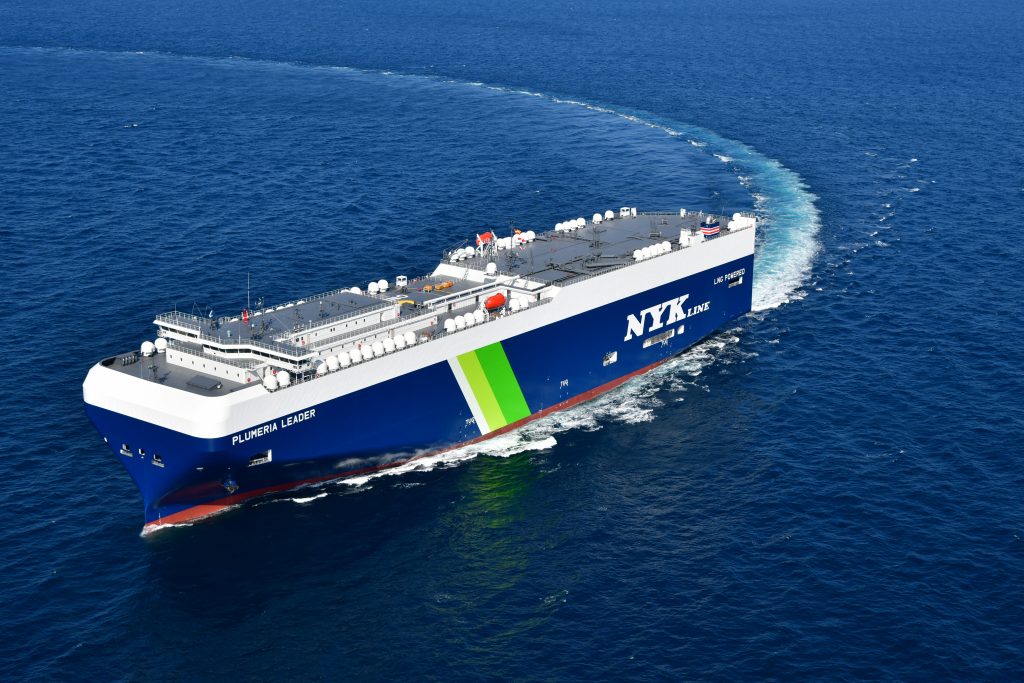Japanese and British Companies Collaborate to Develop World’s First Biomass-Fueled Ship

In a landmark move towards sustainable maritime transportation, leading Japanese companies NYK Line (NYK), NYK Bulk & Projects Carriers (NBP), TSUNEISHI SHIPBUILDING Co., Ltd., and British renewable energy firm Drax Group have signed a memorandum of understanding (MoU) to pioneer the development of the world’s first biomass-fueled ship, commonly referred to as a “bioship.” The MoU was signed at the British Embassy in Tokyo.
This ambitious project aims to leverage biomass as a key component in Japan’s transition from fossil fuel-based power generation to low-carbon and renewable energy sources. Japan’s demand for biomass pellets, mainly sourced from North American sawmill and forestry residues, is on the rise. Drax, with production facilities in the US South and Canada, plays a significant role in this supply chain, transporting biomass pellets to Japan via NBP.
Currently, these biomass pellets are shipped using smaller handysize bulkers, which face challenges in switching to low-emission fuels like ammonia due to their limited fuel tank capacities. The new initiative seeks to overcome these limitations by developing an on-board biomass fuel plant. This innovative plant would use a gasifier to convert biomass into gases such as carbon monoxide, hydrogen, and methane, which would then power a generator to propel the bioship and supply some of its internal power.
The projected impact of this development is substantial. The bioship, equipped with a biomass fuel plant, could achieve a 22% reduction in well-to-wake carbon emissions compared to traditional fossil fuels. If successful, the partners plan to construct the first bioship by the end of 2029.
Shinichi Yanagisawa, Executive Officer of NYK Line, emphasized the company’s commitment to achieving net-zero greenhouse gas emissions by 2050. “This initiative is part of NYK’s long-term target of net-zero emissions of greenhouse gas (GHG) by 2050 for the NYK Group’s oceangoing businesses. The NYK Group is committed to providing its expertise in low-carbon and decarbonised maritime transportation as per this MOU and will utilize the knowledge gained in this research and development to promote initiatives related to various energy-saving technologies,” said Yanagisawa.
Paul Sheffield, Chief Commercial Officer of Drax Group, highlighted the MoU’s significance for Drax’s decarbonization goals and the broader shipping industry. “Drax aims to be carbon negative by 2030 and decarbonising our supply chain is critical to reaching this goal. This MoU is an important step in the development of the technology required to power and launch the world’s first bioship, which will support Drax’s decarbonisation goals but could also drive the innovation needed to transform shipping and cut carbon emissions and fuel costs in global supply chains,” Sheffield stated.
Masashi Suda, President of NBP, expressed enthusiasm for the project’s potential to contribute to global decarbonization. “Drax is a leading renewable energy company, and we are honored to be a part of this symbolic project to use its main products as environmentally friendly fuel in transportation of the products themselves,” Suda noted.
Kenichi Shibata, Managing Executive Officer of TSUNEISHI SHIPBUILDING, reiterated the company’s commitment to environmental sustainability and innovation. “TSUNEISHI SHIPBUILDING focuses on reducing the global environmental impact in the design and construction of our vessels and has declared ourselves to achieving carbon neutrality by 2050. For realising this aim and recognising ourselves to be a frontrunner of environmentally friendly yard, we are driving to develop and construct new fueled vessels which combining environmental impact reduction and economic efficiency,” Shibata commented.
As these industry leaders collaborate, the development of the world’s first bioship represents a significant step towards greener global supply chains and a decarbonized future for maritime transportation.
